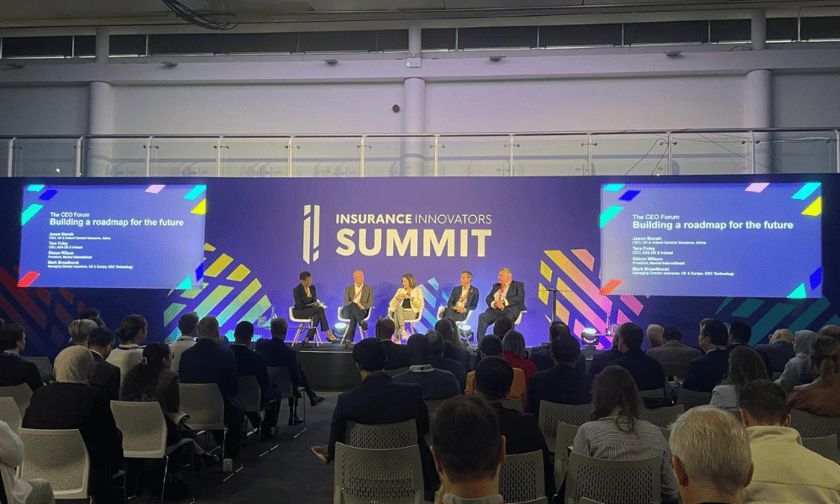

The role of insurance in ‘Building a roadmap for the future’ was under scrutiny during a CEO panel discussion at the 2024 Insurance Innovators Summit in London – with AXA UK&I CEO Tara Foley (pictured centre) underscoring how insurers can help navigate future risks as well as current risks.
Touching on the “significant” role the industry has to play, she noted that insurance can and should be very impactful. “I do feel very passionately about the insurance industry,” she said. “We have a real purpose. What do we do? We manage risk. What affects risk? Everything. So, it's incumbent upon us to be monitoring and getting views on all of the major themes that are affecting society.”
Foley addressed the publication of AXA’s latest ‘Future Risks’ report which highlighted how awareness of conflict is having a ripple effect across society. Then there’s the “old favourites” of climate, cyber, data and technology, she said. Each of these brings opportunities but they also present very significant risks and the potential for unintended consequences.
The polycrisis nature of today’s risk environment requires insurers to be looking at all these elements, she said, and to play their role in educating all stakeholders about the risks they face. The interconnectivity of risks in today’s risk environment means that each individual risk is being amplified in its effect. Amid the complexity of this environment, insurers are in the privileged position of being able to strip back that complexity, to facilitate conversations and to influence decision-making.
Foley looked to the devastating floods that hit Spain last week, and said she spoke to AXA’s CEO in Spain about the way the disaster unfolded and the shocking inability, “to predict, and then to protect and then even to deal with it once it happened.” Nobody should be arrogant enough to think that what happened there couldn’t happen to them, she said, and everyone needs to look at this example and learn from it.
“I think that one of the things as an industry we've been very reliant on is that we use the behaviour and the patterns of the past to predict the future, and that link is not as strong as it used to be,” she said. “So, we need to innovate our models. We need to think about our predictive models. We need to think about the data that goes into those models. And... also our mindset just has to evolve.”
For Foley, innovation and resilience are key elements of how the insurance industry can step up to the plate and play a critical role in supporting the future of our societies. Prior to the recent UK election, she said, AXA made a point of asking for a minister for resilience.
“If you think about this new government's stated objective to build multiple new homes, because we need them - that's right and ambitious, it's the right thing to do. But where we build those homes and how we build those homes is going to be critically important 10, 20, 30 years out in terms of insurability. We, I think, are in a very privileged position where we've got access to all of this data… and the tools to mine that data to generate insights.”
Also adding his thoughts on how insurers must adapt if they’re going to fulfil their role in building stronger and more resilient societies was panellist Jason Storah (pictured centre, left), CEO of UK & Ireland General Insurance at Aviva. He too credited insurers with an important role to play in leading this dialogue but emphasised that they can’t lead it on their own.
“I think the UK needs a holistic approach to managing things like the impact of climate change,” he said. “If we talk about flood, [it’s] topical because of what's happening in Spain and it's topical because, in the last 10 years, the UK has built one in 13 homes in high risk flood areas. So, project that forward to the number of homes in the future. That doesn’t feel like a future recipe for success.”
Corroborating Foley’s commentary on the power of relevant data, Storah highlighted that in the first six months of this year alone, there were 12 named storms. “I see insurers sharing that data but they cannot do it on their own,” he said. They have to engage and need government and all of the stakeholders to rally around the common objective.”
That’s one key roles insurers have to play, he said, while another is to work pragmatically to help solve this issue. It’s easy to sit and project longer-term trends and thematic shifts, but what actually makes all the difference is when and where insurance companies are putting their money.
